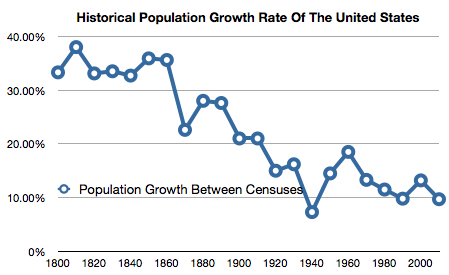Possible American Development Paths
Something that's been interesting to me as I've read about America in the 19th century is how different attitudes toward trade and immigration were back then. These days, of course, we don't have 100 percent no barriers to trade, but we're very very very open to imports of foreign manufactured goods. By contrast, our immigration laws, though liberal by global standards, are incredibly restrictive compared to the open borders regime that prevailed before World War I. Consequently, the population growth rate of the 19th Century United States was staggeringly high:

It's interesting to think about what would have become of the country had we spent our first century or so pursuing the modern consensus view that trade should be more-or-less free but borders open to immigration would be politically unrealistic and unthinkable. The answer, presumably, is that at least initially the country would have been really really rich. The low tariffs would have substantially boosted real purchasing power. They also would have impeded the development of American industry. But that wouldn't have mattered, since given a much lower rate of immigration the ratio of land to workers would have been extremely high. So you'd have a rich, sparsely populated country with an economy geared toward agriculture and natural resource exploitation. Something that looked a lot like Canada or Australia, in other words, rather than the industrial dynamo we became.
I wonder if continued industrialization in Asia means this will be our fate anyway. Over time, the very densely settled triangle between Pakistan, China, and Indonesia that contains about half the world's people should be the "core" of the world economy, with North America looking sparsely settled and resource-rich.


Matthew Yglesias's Blog
- Matthew Yglesias's profile
- 72 followers



